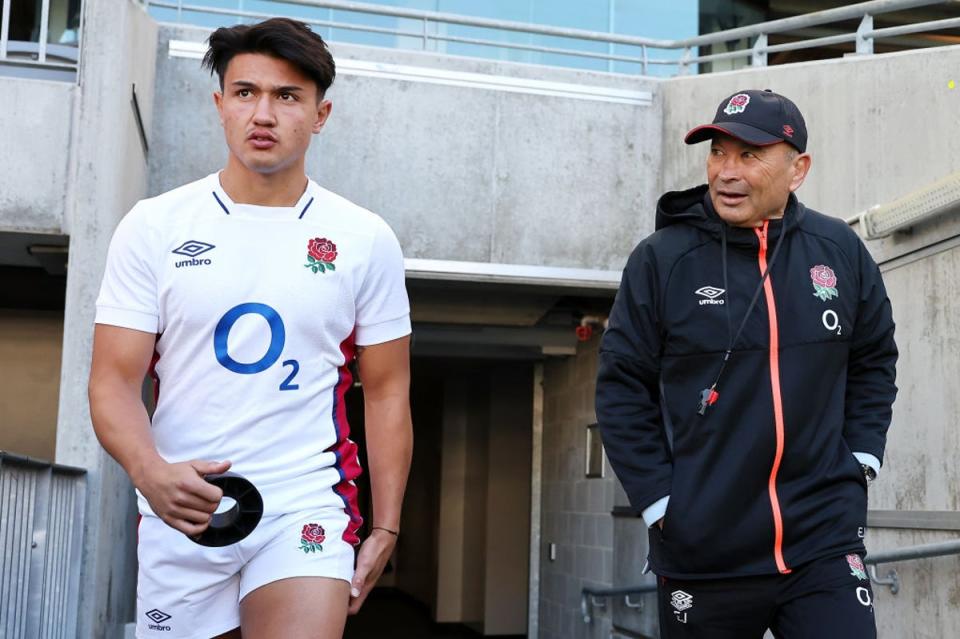England fight to find consistent formula as Eddie Jones rings the changes for second Test

In the week that saw the ousting of one man from high office in London, some 10,000 miles away another under-fire leader is battling to prove that he can reproduce the successes of 2019. England begin in Brisbane with just two wins in 2022 and 1-0 down to Australia – and Eddie Jones, true to tinkering form, has conducted a reshuffle of his own.
The latest backline roll of the dice from Jones is again tough to square with his desire for greater cohesion. In come three virtual newbies: two debutants in Guy Porter and Tommy Freeman, and Jack Van Poortvliet, promoted from the bench having been afforded only a fleeting, though try-scoring, glimpse of international rugby a week ago.
The Leicester scrum half is the fourth different starting nine of the year (all of whom are currently fit), while Porter and Owen Farrell form another new centre partnership tasked with establishing a quick connection outside of Marcus Smith – who does at least have a degree of permanency at number ten.
“We have decided to make changes in our back line, they were tough calls but we feel they will strengthen the team,” Jones explained of another surprise selection. “There are opportunities to attack against Australia which we can take.
“This game is the perfect practice for the World Cup and our focus is putting on our best performance.”
So much for the search for continuity, the thought of further building upon the relationships forged in Perth. The snap approval polls after the opening match of the series would have made grim reading for Jones, but there is little sign of him abandoning his focus on next year’s tournament, such is the strength of his post-2019 mandate and backing from above.
Yet an increasingly frustrated set of supporters are tiring of the jam tomorrow approach. While the long-term build and the need for some form of immediate success need not be mutually exclusive, the sense is that England fans are finding the dismissal of the importance of all fixtures until next year’s World Cup rather dispiriting. And it is all very well mapping a route to success, but a forward step towards it must be taken at some point.
Which is not to say there is not logic to the latest rejigging. Northampton’s Freeman would appear a good fit in England’s attack of multitudes, and the versatile Porter, too. Jones hopes the former Sydney University captain’s sharp angles may cut Australia open more often than England managed to a week ago and provide more effective foil for Smith and Farrell.
Dave Rennie has been forced into changes as Australia, now favourites, seek to seal the series. Andrew Kellaway and Len Ikitau have been added to an already extended absentee list from that tough first 35 minutes a week ago, with Quade Cooper, Allan Alaalatoa, Tom Banks and Darcy Swain all, as expected, unavailable.
Jordan Petaia, Tom Wright and Hunter Paisami are the beneficiaries in the backs, with Noah Lolesio retained at fly half. If Smith continues to drift out the back the England fly half best beware the hard-hitting centre Paisami shooting out of the line, though Australia’s alterations may create opportunities if England’s discordant attack can at last coalesce.
Up front, a fit-again Taniela Tupou’s collisions with Ellis Genge and the rest of England’s pack in tight and loose could be tectonic. “It’s not personal, but it is personal. I will do what is best for the team but when you get out there you want to be better than your opposition,” the man they call the “Tongan Thor” said of his encounter with the England loosehead.
“Ellis Genge is going to come out there and try to give it to me and smash me. I will do exactly the same thing. I want to give it to him. We will see what happens out there.”
England flanker Tom Curry has returned home after his head injury, meaning a starting berth for Sam Underhill.

The breakdown will again be hard-fought, and to that end Jones’s side can count upon less support from their back-benchers than usual – the head coach has named just Danny Care and Henry Arundell among his replacements, favouring a sixth forward in Jack Willis in a bid for more scavenging success as the game wears on.
Jones has never lost a Test in Brisbane, winning six as coach of the Wallabies before that opening success on England’s tour six years ago. For a variety of reasons, an ending of that run would not place Jones in immediate peril. But the debatable signs of “solid progress” that the Rugby Football Union (RFU) identified after the Six Nations would grow ever more distant with another defeat.
South Africa vs Wales
No shortage of Welsh hand-wringing at South Africa’s decision to stick to a planned strategy and change almost their entire side for the second Test. Perhaps the punchiest comment came from Sir Gareth Edwards.
“If there had been five or six changes, you would maybe have raised an eyebrow. But 14 changes? It’s overwhelming,” opined the great Welsh scrum half. “I don’t think it shows respect for Wales. There is only one way to view it and that’s to give them a good tonking, as they say.”
Edwards’s demand for a tonking will not come easily. Wales face a tough task, perhaps now burdened with a certain expectation but up against a far from standard second-string. An almost entirely different South African side it may be but it is still one containing considerable quality, from returning key figures Pieter-Steph du Toit and Handre Pollard to Evan Roos and Kurt-Lee Arendse, URC standouts who are handed deserving debuts.
New Zealand vs Ireland
Another week, another discussion of concussion protocols, with particular focus on the place of Johnny Sexton in the Ireland side. To recap, the Ireland captain failed an initial in-game head injury assessment (HIA) during the first Test against New Zealand, but subsequently passed two further examinations by independent consultants.
Under the set-out protocols, Sexton is ruled not to have been concussed and is clear to play, and it is understandable that Ireland have picked him when available. Yet given the ever-developing knowledge of brain injuries in rugby, it still sits uneasily that a player with Sexton’s history is permitted to play having been removed last week.

That is also the position by Progressive Rugby, a leading lobby group, who said in a statement: “Elite players who fail an in-game HIA1 have, by definition, displayed cognitive dysfunction requiring their removal.
“In our view, this is sufficient evidence, regardless of subsequent testing, to exercise extreme caution for the good of both their short and long-term health. This caution must be further amplified in players with a history of brain injury, as evidence is they are at higher risk of sustaining further concussions and other injuries.
“The fact is there remains no examination by any expert that can demonstrate a brain has healed and is not at risk of further damage. As such, if player welfare is truly the game’s number one priority, the only option must be to err on the side of caution – otherwise the new elite protocols are failing in their key purpose.”

